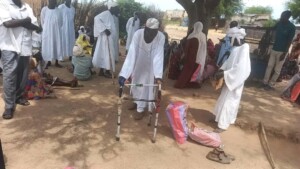‘Humanitarian disaster’: 19,287 cases of malaria in North Darfur last month
The Central Committee for Medical Laboratories recorded 19,287 cases of malaria in North Darfur between August 25 and September 25. In a report on Wednesday, it called for rapid government intervention, calling on international and regional organisations, activists and entrepreneurs to work together to deal with the humanitarian disaster in North Darfur.
 A mosquito spreading malaria (Social media)
A mosquito spreading malaria (Social media)
The Central Committee for Medical Laboratories recorded 19,287 cases of malaria in North Darfur between August 25 and September 25. In a report on Wednesday, it called for rapid government intervention, calling on international and regional organisations, activists and entrepreneurs to work together to deal with the humanitarian disaster in North Darfur.
The Sudanese Doctors Central Committee reported 382 cases of malaria in El Fasher in September. 281 people were treated at hospitals in the city because of malaria, four patients died.
The medics pointed to a shortage of doctors and nurses, which delays the treatment of patients, and a lack medicines and medical equipment. They further noted that many people can now be classified as vulnerable because of increased malnutrition figures due to the soaring prices of basic commodities.
OCHA
The UN Office for the Coordination of Humanitarian Affairs (OCHA) reported yesterday that humanitarian partners have developed a cholera readiness and response plan and are seeking $ 20.3 million for the next three months. The plan will focus on coordination, surveillance and reporting, community engagement, WASH and food safety, the Oral Cholera Vaccine, health system strengthening, and nutrition.
Partners will target 13,000 people for cholera case management, 1 million people (including refugees in camps at risk) with health services, 2.5 million people with WASH assistance and 300,000 severely malnourished children. 546,000 mothers and caregivers will access infant and young child feeding counselling.
Our editorial independence means that we can continue to provide factual updates about ongoing protests to Sudanese and international actors, educate people about how to avoid outbreaks of infectious diseases, and provide a window to the world for those in all corners of Sudan. Support Radio Dabanga for as little as €2.50, the equivalent of a cup of coffee.












 and then
and then